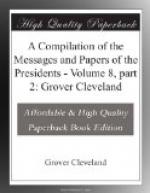claim of the party to whom such service or labor may
be due” from being carried into effect.
But these acts of State legislation, although they
may cause embarrassment and create expense, can not
derogate either from the duty or the authority of
Congress to carry out fully and fairly the plain and
imperative constitutional provision for the delivery
of persons bound to labor in one State and escaping
into another to the party to whom such labor may be
due. It is quite clear that by the resolution
of Congress of March 3, 1821, the marshal of the United
States in any State in which the use of the jails
of the State has been withdrawn, in whole or in part,
from the purpose of the detention of persons committed
under the authority of the United States is not only
empowered, but expressly required, under the direction
of the judge of the district, to hire a convenient
place for the safe-keeping of prisoners committed under
authority of the United States. It will be seen
from papers accompanying this communication that the
attention of the marshal of Massachusetts was distinctly
called to this provision of the law by a letter from
the Secretary of the Navy of the date of October 28
last. There is no official information that the
marshal has provided any such place for the confinement
of his prisoners. If he has not, it is to be regretted
that this power was not exercised by the marshal under
the direction of the district judge immediately on
the passage of the act of the legislature of Massachusetts
of the 24th of March, 1843, and especially that it
was not exercised on the passage of the fugitive-slave
law of the last session, or when the attention of
the marshal was afterwards particularly drawn to it.
It is true that the escape from the deputy marshals
in this case was not owing to the want of a prison
or place of confinement, but still it is not easy
to see how the prisoner could have been safely and
conveniently detained during an adjournment of the
hearing for some days without such place of confinement.
If it shall appear that no such place has been obtained,
directions to the marshal will be given to lose no
time in the discharge of this duty.
I transmit to the Senate the copy of a proclamation
issued by me on the 18th instant in relation to these
unexpected and deplorable occurrences in Boston, together
with copies of instructions from the Departments of
War and Navy relative to the general subject.
And I communicate also copies of telegraphic dispatches
transmitted from the Department of State to the district
attorney and marshal of the United States for the
district of Massachusetts and their answers thereto.




